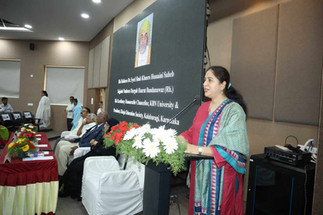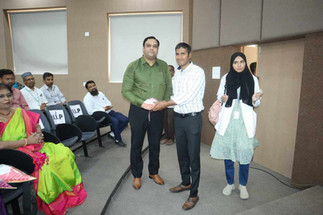Common Household Poisons
- barikhateeb
- Mar 18, 2024
- 3 min read
Updated: Nov 13, 2024
The Department of Forensic Medicine and Toxicology at Khaja Bandanawaz University organized a special lecture on “Common Household Poisons” on the 18th of March 2024. The lecture aimed to raise awareness about the potential dangers present in everyday household items and provide strategies for preventing accidental poisoning incidents.
The event commenced at 10:00 AM with a brief introduction by Dr. Syeda Safura Fatima, Tutor, Dept. Forensic Medicine & Toxicology, who initiated the program with a recitation from the Holy Quran the screen to set a solemn tone. The anchor then introduced the theme of the lecture, emphasizing the importance of understanding household poisons for the safety of individuals and families.
Dr. Zama Moosvi, Prof. & Head I/C of the Department of Forensic Medicine and Toxicology thanked Almighty God and Patrons of KBN University and extended a warm welcome to the audience and introduced the guest speaker, Dr. T.K.K. Naidu, Vice Principal, Prathima Institute of Medical Sciences and Former Chief Police Surgeon at Tripoli, Libya.
Dignitaries including Dr. T.K.K. Naidu, Dr. P. S. Shankar Prof. Emeritus and Senior CEO of FOMS – KBNU, Dr. Nishat Arif Hussaini, Dean of FoAHSSLSC/L/Ed, Dr. Siddesh Sirwar Dean FOMS &Dr. Zama Moosvi, Prof & Head I/C of the Department of Forensic Medicine and Toxicology, were felicitated during the event.
Dr. T.K.K. Naidu, Vice Principal, Prathima Institute of Medical Sciences, delivered an insightful lecture on common household poisons. He elaborated on various toxic substances found in households, their potential risks, and preventive measures to mitigate poisoning incidents. The lecture was very informative and lively, engaged the audience, fostering a deeper understanding of household safety practices.
Dr. Siddesh Sirwar, Dr. Nishat Arif Hussaini and Dr. P. S. Shankar delivered speeches, highlighting the significance of the topic, and commending the efforts of Dr Zama Moosvi in hosting such an informative event.
Dr. Khaja Azizuddin Junaidi, Assistant Professor, Department of Forensic Medicine and Toxicology, expressed gratitude to the dignitaries, guest speaker, organizers and attendees for their participation and contributions to the success of the event. He emphasized the importance of implementing the knowledge gained from the lecture to ensure household safety.
The event was followed by high tea.
The special lecture on "Common Household Poisons" proved to be a valuable initiative by the Department of Forensic Medicine and Toxicology at Khaja Bandanawaz University. It provided attendees with crucial insights into identifying and preventing poisoning incidents within households. The event facilitated knowledge exchange, raised awareness, and underscored the university's commitment to promoting public health and safety.
ABOUT THE LECTURE
Dr. T.K.K. Naidu, Vice Principal, Prathima Institute of Medical Sciences delivered special lecture on Common Household Poisons.
He gave a comprehensive understanding of various types of household poisons, spanning from everyday cleaning agents to medications, poisonous animalsand even seemingly innocuous items like plants. Through this exploration, he gave invaluable insight into recognizing and mitigating these risks effectively.
One of the fundamental principles underscored in the discussion was the importance of proper storage and labelling of hazardous substances. By securely storing chemicals and medications out of reach of children and ensuring clear and accurate labelling, we can significantly reduce the likelihood of accidental exposure.
Furthermore, he highlighted the critical signs and symptoms of poisoning, emphasizing the importance of swift action and seeking medical assistance when necessary. Early recognition of these symptoms can be pivotal in preventing serious harm and facilitating timely intervention.
In addition, he underscored the significance of maintaining readily accessible emergency contacts, including poison control centres and local medical facilities. Being prepared and knowing whom to contact in the event of an emergency can make all the difference in mitigating the consequences of poisoning incidents.
Lastly, he discussed preventive measures such as proper disposal of expired medications and chemicals and exercising caution when using alternative or natural products. By adopting these preventive measures, we can proactively minimise the risks associated with household poisons.
In conclusion, he urged attendees to internalize the insights gained from the lecture and incorporate them into our daily routine. By fostering a culture of awareness and safety within our homes, we can create environments conducive to the well-being of ourselves and families.
































Comments